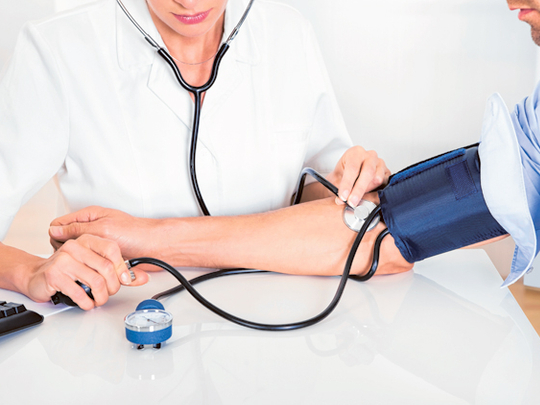
Dubai: Around 30 per cent of adults in the UAE have high blood pressure and the prevalence could increase with time, health officials said on Monday in Dubai.
Three separate studies in Dubai, Abu Dhabi and Al Ain all suggest that around a third of the UAE population has hypertension (high blood pressure), officials said during the closing ceremony of the MMM18 awareness campaign.
MMM18, or May Measurement Month 2018, was held in May in the UAE and other countries to measure people’s blood pressure and raise awareness about hypertension. Both expats and Emiratis' vitals were monitored. The closing ceremony of MMM18 was held by the Ministry of Health and Prevention.
Dr Hussain Al Rand, Assistant Undersecretary for Health Centres and Clinics, Ministry of Health and Prevention, presented a keynote address at the ceremony, highlighting the success of MMM18.
Also speaking at the ceremony, Professor Afzal Hussain Yousuf Ali, consultant cardiologist at Dubai Health Authority (DHA), said: “If we look at hypertension in UAE, there have been three studies — two of them in the local [Emirati] population in Abu Dhabi and Dubai, the other one was done in the non-local [expat] population in Al Ain. And the approximate prevalence is that about 30 per cent of adults have high blood pressure.”
‘Silent killer’
He added: “But less than 50 per cent of them know about it, and that’s the whole problem … It [hypertension] is a silent disease, nobody knows about it until it strikes.”
Hypertension is described as the world’s biggest “silent killer” because its signs or symptoms usually go unnoticed — yet it kills some 10 million people globally, officials said during the event.
On Monday, Prof Ali said earlier hypertension prevalence rates in the UAE were “probably less, but we haven’t got much [information] in those [previous] surveys”.
He added that the latest available 30 per cent rate “is expected to increase with time because of [an unhealthy] lifestyle”, stress and other risk factors.
UAE’s 30 per cent prevalence, as indicated by the three studies, is the same as England; much higher than Canada (19.5 per cent) and marginally more than the US (29.1 per cent), based on national surveys there, Prof Ali said.
He added that the three studies were conducted separately by different health authorities in the UAE a few years ago, including in Dubai by the DHA as part of an international study. In all, the surveys covered tens of thousands of people.
More insights
However, findings of the recent MMM18, revealed during Monday’s event, also provide more insights about hypertension in the UAE.
More than 31,300 people were screened in May at hospitals, clinics, shopping malls, labour accommodations, offices, homes, and mosques in the UAE.
Around 20 per cent were found to have hypertension in the month-long health campaign — around two in five of them had “not controlled” their condition.
Also, almost 14 per cent of people had high blood pressure but were not on any treatment — two-thirds of them did not even know they had high blood pressure.
Another 4,236 people had never checked their blood pressure before. 508 of such cases were found to have high blood pressure, many in the “moderate to severe” range (more than 160/100mmHg).
“So, we are finding a big number of them have blood pressures which needs treatment urgently.”
Speaking about the millions of deaths caused by hypertension worldwide, Prof Ali said: “These deaths are preventable and that is the tragedy, that these lives are needlessly lost. That is why measuring blood pressure saves lives. That is what we have been doing [with MMM18].”
Higher targets
Prof Ali said he hopes that following the success of MMM18, the next edition will double its scope to reach 60,000 people in the UAE.
“I think we have shown that together we can make a difference. We have to increase the awareness, the treatment and control needs to follow. There are other risk factors that need to be tackled, like smoking, diabetes, physical inactivity. The Ministry of Health is working on it, we know that. We should all help the ministry as civil societies.”
Later in the ceremony, people who supported MMM18 were honoured on stage for their efforts.
The platform was also used to announce the UAE’s participation in the international Angina Awareness Initiative. Angina is pain in the chest that is symptomatic of heart disease.
All you need to know about blood pressure
What is hypertension?
Hypertension is a health condition in which a person has high blood pressure. It means the force of blood pushing against the walls of blood vessels is too high consistently.
Why is it dangerous?
Hypertension is especially dangerous because its symptoms or signs are usually “silent” or imperceptible. It can cause damage to the blood vessels and the heart for years without the person even realising it. Sometimes the damage can be fatal.
What are the causes?
In most adults, hypertension is ‘primary’ or ‘essential’, meaning there is no known cause. In others, hypertension is ‘secondary’ to an underlying condition, such as kidney problems or birth defects of blood vessels.
How is blood pressure measured?
• It is measured in millimetres of mercury (mm Hg).
• Blood pressure is shown as two numbers. The top number, called systolic, is the pressure when the heart beats. The bottom number, called diastolic, is the pressure when the heart is resting between beats.
• Normal blood pressure is regarded as below 120/80 mm Hg.
• High blood pressure is a pressure of 130 systolic or higher, or 80 diastolic or higher, that remains high consistently, not just in one reading.
How does it harm the body?
What are the risk factors
• Smoking
• Diabetes
• Obesity
• Inactive lifestyle
• Unhealthy food
• Family history
How is blood pressure controlled?
• Medicine
• Exercise
• Healthy diet












